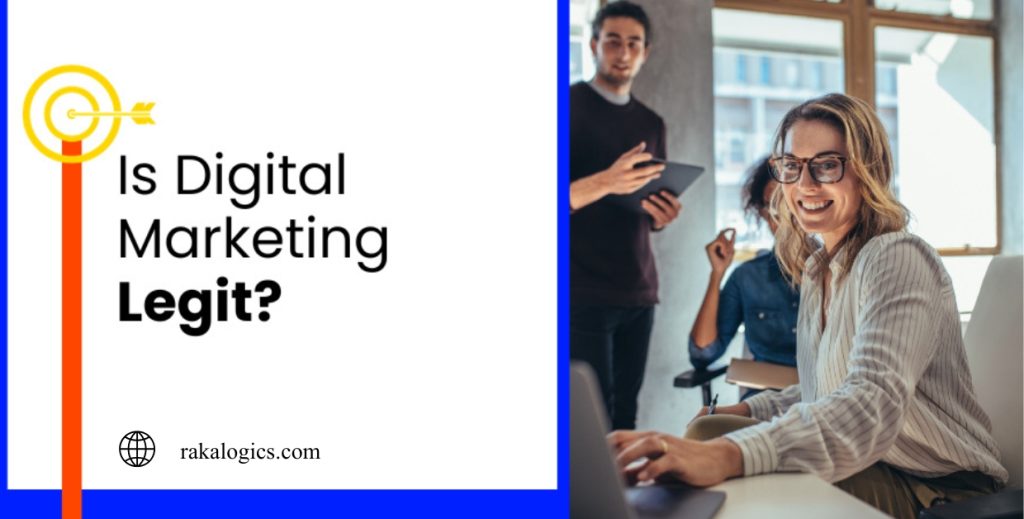Is digital marketing legit? In the modern business world, this question is relevant as companies of all types and sizes look to navigate the virtual world to connect with prospects, increase brand recognition, and generate revenue. Today, digital marketing is known to have transformed how any brand communicates with its potential audience, using the symbiosis of technology and calculated outreach to deliver tangible return on investment. With its data-driven, real-life validation, and SEO-friendly, this article discusses the effectiveness and legitimacy of digital marketing toward maximizing ROI.
What is Digital Marketing?
Digital marketing utilizes any form of online platform through which a product or service can be advertised and spread to people who make full use of these mediums and channels. It has strategies that range from very vast categories with unique advantages associated with each one of them.
1. SEO (Search Engine Optimization)
2. Content Marketing
3. SMM (Social Media Marketing)
4. PPC (Pay-Per-Click Advertising)
5. Email Marketing
All these combine to provide businesses with tactics for engaging, communicating, and converting customers at all points in the buying cycle.
There is sufficient evidence that digital marketing works, and therefore it is not only real but also crucial for businesses during this time. Here are some of the most potent evidence showing:
1. Global Engagement
Digitally, businesses are exposed to wider global audiences. It provides growth opportunities that its traditional counterparts just can’t match. With over 5 billion internet users, businesses can access potential customers almost anywhere, at a much lesser cost than its traditional alternatives.
2. Precision in the Targeting Process
Digital marketing is one of the prominent strengths through which a target demographic can be reached with a great deal of accuracy. Brands can tailor their campaigns on Google Ads, Facebook, and Instagram according to the age, location, interests, and behaviors of the user. This is a form of targeting that doesn’t waste a single penny, thus making it highly result-oriented in terms of ROI.

3. Cost-Effective Campaigns
Digital marketing is cheaper than traditional advertisements. Instead of expensive billboards or TV ads, brands can use cheap PPC and social media advertising. This makes it possible for businesses, especially small and medium enterprises, to compete successfully without going broke.
4. Measurable Results and Analytics
Most importantly, measurement is one of the high points of digital marketing. Digital marketing tools like Google Analytics and Facebook Insights can precisely determine the campaign performance in real time, so marketers can measure its impact and modify the tactics accordingly. Such an approach makes digital marketing trackable and result-oriented – sure to sound credible.
Most digital marketing campaigns see a high conversion rate, especially if targeted and optimized content is used. For instance, email marketing has an average ROI of 3800% according to HubSpot. Such data-driven results guarantee that digital marketing will grow businesses effectively.
SEO in Digital Marketing Legit-The Key to Visibility and Legitimacy
Search Engine Optimization (SEO) is the most crucial component in a contemporary digital marketing strategy. Proper SEO techniques ensure that your content reaches the target audience directly because your increased presence on the world’s largest search engines will do that. Below are some SEO elements supporting both the legitimacy of the medium and measurable growth:
1. Keyword Research and Optimization
Keywords are the search terms that link the content to the searchers. This enables businesses to identify relevant terms for the industry using keyword research tools such as Google Keyword Planner and add them to the content. Keyword usage also increases ranking on search engines, thus making content more visible and accessible.

2. Quality Relevant Content
The search engines rank preferentially websites with beneficial information that is original, distinctive, and helpful in information delivery. Google for example favors good quality with the preferred ranking of its outputs at search times. It involves updating regularly informative content to attract visitors as well as creating branding authority and trustworthiness.
3. On-page Optimization
On-page SEO is all about optimizing all the components on every page, whether it is title tags, meta descriptions, or headings, to increase search rankings. Well-structured pages that follow the best practices in SEO will be more prone to search engine discovery; hence, this is an essential step in any credible digital marketing strategy.
4. Backlink Profile Building
A backlink from any reputable site enhances the credibility of a website from the search engine’s perspective as it is considered to be a trustworthy source. Having a strong backlinking strategy enhances trustworthiness, propels ranking within search engines, increases the volume of traffic to your website, and can be seen as more credible regarding digital marketing.
5. Mobile Optimization
Over 60% access websites from mobile devices. Search engines penalize sites that are not mobile optimized; thus, mobile optimization has been essential for both SEO and user experience. A responsive website enhances ease of access, boosts SEO ratings, and makes digital marketing sound logical.

Digital Marketing Legit Challenges and Misconceptions
Although digital marketing is largely effective, misconceptions and challenges stand against its success:
1. Deceiving Vanity Metrics
UNLESS linked with deeper insights, many digital marketing metrics are shallow. Conversions, customer lifetime value, and engagement rates give the right view of the campaigns running in the market, for which it is important to focus on meaningful data rather than just numbers.
2. Overnight Success Myth
Digital marketing is something that requires effort and strategic planning continuously. It is never done overnight, and lots of businesses expect overnight results when disappointed with the result.
Accepting these needs leads to more realistic and sustainable goals for a business.
It is not about the number of posts but about quality. The value of content you post is much more important than spamming low-quality posts. This high-quality content is also favored by search engines, which means better SEO and engagement.
3. Expertise and Strategy
While some would describe digital marketing as very basic, best campaigns always consider knowing their SEOs and the creatives about how one has to bring that in an effective form using the best-targeted adverts. Spending money on some professional services or classes means campaign formulation will strategically produce optimum campaigns.
The digital marketing industry is changing very fast with emerging technologies in AI, machine learning, and voice search. With these changes, businesses can stay competitive and improve the effectiveness of their digital marketing strategies:
- AI and Automation
AI tools make digital marketing more efficient, taking care of monotony and providing data-driven insights. For instance, chatbots, support customer service 24/7, while analytics platforms powered by AI can give detailed insight that helps form campaign strategies.
- Optimizing for Voice Search
More consumers are now using smart devices, thus leading to an increase in voice searches. Focusing on conversational keywords and direct answers in content adaptation will make it easier for brands to rank in voice search results, increasing their reach.
- Video Marketing
Video marketing is still growing with YouTube, Instagram, and TikTok drawing billions of users daily. Optimizing video content with descriptive tags, thumbnails, and interesting titles will enhance SEO and engagement.
- Local SEO for Local Business
Local SEO is high on the priority list of businesses that operate within particular regions. Optimizing Google My Business profiles and content associated with locations will enable the brand to be at its best in the search results of the local location so that customers can come in near the business location.

Conclusion-Is Digital Marketing Legit?
Yes, digital marketing is no doubt so legitimate and critical in succeeding in business today. Using data-driven results and targeted outreach to establish effective cost management, digital marketing will continue to let brands connect meaningfully with their audience. Thus, using SEO as a basis, businesses can reach wider audiences, convert better, and increase overall return on investment.
Therefore, quality content investments from companies must walk hand in hand with technological adjustments and fine-tuning their digital marketing strategies. As the digital world continues to evolve, so does the potential for businesses to embrace the legitimacy of digital marketing, through which it leverages lasting, measurable impact.
Digital Marketing Legit FAQs
1. What is digital marketing Legit, and how is it different from traditional marketing?
This involves the use of the internet and other online resources to promote the products or services to the customer by using social media, search engines, email, and websites. Compared to more traditional forms of marketing such as a TV ad or billboard, digital marketing tends to be cheaper, more data-driven, and in real-time with precise targeting for audiences, making it much easier to change strategies in real-time based on performance and user engagement.
2. Digital marketing is not only for giant companies but also for small businesses.
Digital marketing is very effective for businesses of all sizes, small businesses included. Most of the digital marketing tools are available at a relatively low price and are effective for the targeted local or niche markets. Small businesses can apply digital marketing to increase their brand awareness, reach their local customers, and thus compete effectively with large companies through well-targeted strategies.
3. How long does it take to see results from digital marketing?
The length of time depends on the approach taken. PPC can immediately start bringing in traffic. SEO and content marketing can be slow, with it sometimes taking several months for traction. Consistent effort, coupled with regular content updates, will often mean there are substantial, sustainable results in 3-6 months.
4. How does SEO affect digital marketing success?
SEO is a part of digital marketing that focuses on making a website easily visible in search engines to get organic traffic. When done right, this allows your site to have higher ranks, which increases its visibility to people with relevant products or services searching on the internet. In effect, businesses can benefit through the increase of online presence, credibility, and results for the long haul, as opposed to spending their time and money advertising for immediate returns.
5. Do I need to hire a digital marketing specialist or can I do it on my own?
However, most of it could be managed on his/her own using online guides and tutorials. There, again, is strategic significance when one hires a service in areas such as search optimization, content marketing, Pay-Per-Click management, and analytics that will genuinely optimize the campaigns by squeezing out the maximum amount from ROI. Most start up by doing everything solo then add experts when a certain scale or complexity creeps in.




